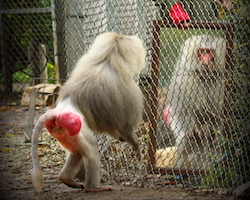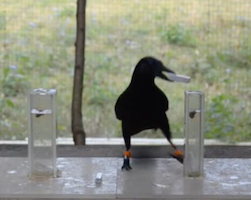Do Ocean Animals Have More Stomach Than Humans?
There are many similarities between humans and other animals that you may have noticed. Humans and animals both eat, sleep, recollect, and communicate. We are also similar in a lot of the ways our bodies work. But we as well accept a lot of differences. Are there any differences that set humans apart, uniquely, from all other animals?
Some people call up that the main differences between humans other beast species is our ability of complex reasoning, our use of complex linguistic communication, our power to solve difficult problems, and introspection (this means describing your ain thoughts and feelings). Others likewise feel that the ability for creativity or the feeling of joy or sorrow is uniquely homo. Humans have a highly adult encephalon that allows us to do many of these things. Simply are these things uniquely man? Showtime, allow'southward become into the fuzzy role of that question.

A birdie is beingness given a mirror test. Prototype by Moshe Blank via Wikimedia Commons.
In that location are a lot of things that humans think are true about animals and animal behavior, but some of these ideas are problematic. Sometimes, when we exercise tests on animal behavior, we use tests that utilize to animals similar humans, and we expect animals to perform in a similar style if they have similar abilities. For example, the mirror test is used to see if animals take awareness of themselves equally the image that they meet in a mirror. If a marking is placed on the animal, they should show signs of knowing that the mark is on their body. Mayhap they try to rub it off with their hands or, if they tin't employ their limbs that way, they may movement their body a flake to see the mark better. Simply what if an animal doesn't have the all-time vision? Do we just say that, because they tin't perform the test in that manner, they wouldn't pass? Expecting all other animals to perform similarly to humans on tests tin be problematic. This makes learning almost some parts of animal behavior difficult.
Only, what we have learned is pretty heady. As we proceed learning more than and more about animal behavior, we are continually surprised.
Gunnison's prairie dogs seem to have a fairly complex language... rather than simply sounding a basic alarm call, researchers accept plant that their alert calls can describe specific predator speed, color, shape, and size... So when is this advice complex plenty for united states to call information technology a language? Elephants accept been establish to communicate across miles of land through subsonic sound. And when researchers slow a hummingbird's chirp down, information technology seems the song may be as complex as a song from some other birds, though more studies need to be done to understand this. Practice nosotros view fauna "language" as limited only because we accept trouble understanding it?

This Caledonian crow is solving a water level problem. It adds small blocks into columns of water to raise the water level, allowing it access to nutrient. The crow also had to realize that one cavalcade was too broad, then the limited blocks wouldn't enhance the water enough. Image from video by Logan C, Jelbert South, Breen A, Gray R, Taylor A via Wikimedia Commons.
Caledonian crows tin can solve problems and build tools, and can solve multiple-stride puzzles that require a programme. Are these examples of difficult problems? Where practice we draw the line to say something is "difficult" enough, or that nosotros've given an fauna proper motivation to want to even solve one of these problems?
Gorillas and chimpanzees take painted pictures of birds, describing (through sign language) that that is what they were trying to create. If they had a goal in mind and so made it, is that a sign that they had introspection? That they are describing their own thoughts? And that they are doing it past using their own creativity? Seems like it might be.
And animals practice appear to feel joy and sorrow. There are videos out there showing a raven using a piece of plastic to sled down part of a snowy roof. The raven picks it up and slides downward over and over again… they aren't playing with another bird, they are enjoying sledding and having fun, perchance feeling joy. And we proceed to learn of more and more species that show sorrow, particularly at the loss of members of their family unit or other loved ones. Animals that grieve include elephants, wolves, bounding main lions, magpies, and many more. A recent video of javelinas (peccaries that alive in the American southwest) bear witness that they mourn their dead. But we didn't realize this, until information technology was captured by a field photographic camera.
And then maybe there isn't that much that makes united states uniquely human. Maybe nosotros need to pay more attention to what animals are doing, and try to view the world through their optics. And, perhaps our ability to consider creature's feelings and hope for the well-existence of these other amazing creatures is our all-time, and most uniquely human ability.
Source: https://askabiologist.asu.edu/questions/human-animal-differences
Posted by: kellygeression1998.blogspot.com

0 Response to "Do Ocean Animals Have More Stomach Than Humans?"
Post a Comment